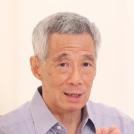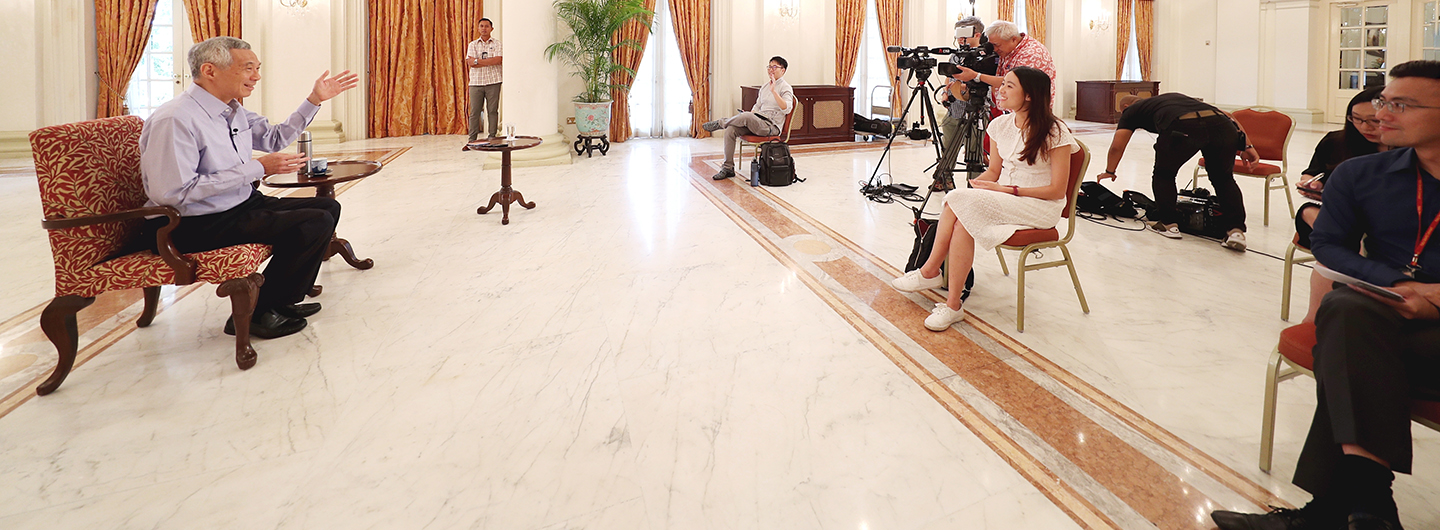PM Lee Hsien Loong gave a doorstop interview to local media at the Istana on Friday, 27 March 2020.

PM Lee Hsien Loong: I wanted to have a chance to talk to you because we had the Resilience Budget yesterday – it was a very major package. I wanted to give you my take on the situation and why we did this and what lies ahead.
We are in a very grave situation. Health wise, with a COVID-19 pandemic. Economy-wise, with the impact on economies all around the world and on Singapore. Also, in terms of the cohesion of the society, the confidence and response which is necessary. It is absolutely crucial for us to hold together, to respond effectively to the immediate challenge, and also to give people confidence that we can cope with this – we have the resources, we know what we are doing, we are ready for what lies ahead. And what lies ahead is very uncertain. Many possibilities, which are very worrying. We have to be prepared for them, and we must be ready if it comes, we are able to respond to them.
That is why yesterday, DPM Heng made the Resilience Budget, which had $48 billion, and $17 billion draw on the reserves with the President's approval. It is unprecedented, but in this situation, it is absolutely necessary.
On the health side, the COVID virus. My analogy is that tide has not turned. We have been fighting, and the tide is still coming in. What has changed is that we have put up our dykes, we have held the water out, but the dyke leaks. We have got bits coming in, people coming home, the virus gets into Singapore. We have to keep a very vigilant eye on it continuously, and make sure that every drop which comes in we mop it up quickly before a drop becomes a rivulet, a rivulet becomes a stream, then I have a flood, and we are sunk.
Why do I say this? Because you can see what is happening around the world. In China they have had a tremendous outbreak, with superhuman effort they have brought numbers back down to zero. Now they are very worried about the virus coming back to them from other countries in the world. You see it taking off exponentially in Europe now – Italy, Germany, France, Spain and Britain. It is a very grave situation and they are imposing drastic emergency measures – lock downs. Boris Johnson, as Prime Minister, tells his people, my instruction to you is very simple, just stay at home. Because they have decided that it is not tenable to let it just carry on and burn out. They have to do their best to put the fire out. But it is going to be very hard.
You see it in America, taking off now. Now the American numbers I think have exceeded or are about to exceed the Chinese numbers, and still increasing rapidly in places like New York State, on the West Coast. It is a crisis situation. In Chinese they say 一波未平 一波再起, one wave not settled, the next wave has come. This is not the last wave, because you look at other countries in the region who are very worried. India is very worried, Russia, Southeast Asia, Malaysians have locked down, the Thais have closed their borders and Indonesians are also very anxious.
This is all around us and the waves are going to take many, many months and maybe more than a year or two to settle. We in Singapore, we are sitting watching our dyke. Trying to keep ourselves safe and preventing any of this from coming in, and I have a situation which is going out of control. So I am in this for a very long time to come in. To sustain this, I need everybody's cooperation – safe distancing, personal hygiene, cooperation when we are contact tracing and discipline when people come back, stay home notification, stay home. That way we slow the spread of the virus. If you have a spot pop up, we have a good chance to mop it up before it gets out of control and then we have a public health disaster.
I think the healthcare part is a very big problem. The economy part is also an unprecedented problem, because it is so disruptive – production has stopped in the countries which are locked down, so our supplies cannot come in.
I went to my market last weekend at Teck Ghee, and chatted with the tropical fish shop, who has been there donkey years. She says she has a problem – she cannot get her supplies. Her supplies come from Malaysia and Malaysia is locked down. Tropical fish is not an essential item, (so) how does she get her business going? That is just a small example. People are not moving. The goods are still flowing but impacted, but the economies are drastically down. America this week –people are applying for unemployment benefits. Usually they have a couple of hundred thousand. This week, they had 3 million people applying for unemployment benefits.
All around the world that is happening, that hits us; and in Singapore, it hits us particularly hard because we are so dependent on trade and our industries like aviation, tourism, travel, hotel – I mean business has gone to zero. SIA’s business has gone down by 96%. It has come to a halt. This is not going to go away in a hurry, because we are protecting our borders until everything calms down. Other countries are doing that.
China, having brought their cases down to zero, instead of relaxing controls on their borders, have now put up more stringent border protections around themselves, because they are dead scared of COVID-19 coming back into China. That is all going to affect the civil aviation industry as well as globalised economies like Singapore. It is going to last quite a long time. It is not a V-shaped down dip, it is not a U-shaped dip. It has come down. If you are lucky, you can sustain it at a diminished level for quite a long time. If you are not lucky, it will keep on going down, and some pieces are going to have a lot of difficulty, just staying in existence.
The economic challenge is very grave. Therefore, in this situation, we must be quite clear, people must be quite clear that we are doing all we can to help them to stabilise the economy, to preserve jobs, to help companies stay in business – reduce their costs, to help the key industries which are drastically hit, like aviation, to stay (and be) able to continue in semi suspended animation, but able to come back to life when the opportunities come. Whatever it takes to do that, we will to them. That is how we came up with the package yesterday – very drastic wage support scheme – help for the self-employed, the gig economy, help for the companies, help for the households. In fact, we tripled the household support and assistance package. We want to see people through this.
We are under no illusions that this is the end of the story because nobody can tell what lies ahead. In February when we made the budget, we knew it would not be the last word but we thought that it would buy us a few months, and then we will have some time to assess the situation and down the road, we will do more and put together the next package and then see us through the next stage. But we did not expect within one month, the picture was totally changed, the health picture was totally changed, the economic picture was totally changed. Therefore, the policy response, the action from the Singapore government had to be totally changed.
Within one month, we have the supplementary budget, which for these pieces, are four, five (or) six times bigger than the original February budget. But it is necessary and we have the dry powder. If we need to do more, when we need to do more, we will do that down the road. But even then, there will be uncertainty, there will be pain, there will be job losses, there will be cases of the COVID-19 and I am sure along the way as time passes, there will be more people who will not survive and will succumb to the disease. We have to expect that. There will be ups and downs. Therefore, it is critical that we go into this eyes open, strong leadership, good government, united and determined to see this through.
That is what I explained to the President. I did not really have to say in all that detail because the President is reading the newspapers and reading the Cabinet papers. She knows and she has her own feel for what is the situation. When we made the case to her, she understood and she supported what we are doing. That is what she said in her letter to Parliament, which the Speaker read out yesterday.
So that is where we are now. I wanted to give you this backdrop, and I am happy to take any questions you have.

Lianhe Zaobao: PM, how long can this massive package tide us through? I think DPM Heng did not rule out the possibility of tapping into the reserves again. He also said that we might have to do more down the road. Do we have room for that, and is that a likely scenario?

PM Lee: It is quite possible. The components of the package are designed to be lasting for three-quarters until the end of the year, and the payments are meant to stretch out until the end of the year.
So at the very least, as we approach the end of the year, we will have to think whether we need to extend that package, and if so, whether you want to modify it, increase or decrease it, or whatever. That we have prepared for, but we must also be psychologically prepared that if things actually get worse during the next few months before the end of the year, we may need to do something even before that. If it comes to that, we will go to the reserves.
We have tapped from the reserves for this package – $17 billion. The total amount of reserves, that we do not publish but we have much more than that, and it will see us through for quite a long time. It is just as well that we have not gone and listened to the people who said to us – you do not need so much, why are you saving all this money, just touch it and we will be all right. But, we kept it aside. I think this is not just a rainy day, it is a mighty storm as DPM said, and we will do what we need to do.

Straits Times: What assurances can you give to Singapore businesses in terms of government support in the case of a drawn-out crisis that stretches to a year or two?

PM Lee: The cost side, we can do a lot because wages for example – we have the job support scheme across the economy is 25% of wages. For the food services industry, it is 50% of wages, for travel and aviation it is 75% of wages. That is a huge amount of money, and I think it makes up about $15 billion out of the package yesterday, one third. That we can continue.
If you are looking at rentals and costs like property tax, that also we have a lot of flexibility to continue to use those as means to help people.
What is difficult for us to do is to bring back the business when there is no business. If I have to lock down the public entertainment, then is very difficult for the discos to operate. It is very difficult if you are a DJ, where do you get your gig? If there is no international flights, because other countries have locked down their borders, then it is very difficult to keep SIA pilots and crew flying. If they are not flying, they do not get their flying allowances, and that is 60% of their pay. It is a very substantial hurt to them.
There will be other impacts like that which is going to be very difficult for us to completely neutralise. What we can do is to find ways in which to redeploy the people who are now freed up. While their day job is not there, but SIA as an organisation is a very capable organisation. Their people are very good, they know how to do service and I am sure we can use them elsewhere. Whether we are using the organisation to do contact tracing, or whether we are using them to be guides, to be encouraging people to keep social distance and to have the right behaviour in public places.
I think that we have to work hard to find ways to redeploy the people who are inevitably going to be at the very least under-employed during this period. You are talking about tens of thousands, maybe hundreds of thousands. The Americans, they had one estimate that they think, I do not know whether he meant it seriously, but this was a member of the Fed who said 30% unemployment

CNA: Just now we are talking about businesses, what about for households? How do we assure people that this is enough and how long can it go for? If we are looking at the lower income families, is that enough?

PM Lee: Well, we have always structured the household assistance to have more help for the lower income families, and we have done that here also. The specific schemes are that way, but also we have put more resources into ComCare and into the community, the social work agencies, and we will make sure that if somebody needs help, we will be able to get the help to them.
But I would say that when we lock down, when we tighten up the restrictions, when we have less activities in schools, for example, less mixing in schools, less CCA, in fact, the households, the children who bear the burden more are the ones from the lower income families. Because school is not just going to school and attending class and come home. It is also a place where you socialise, where you mix, where the teachers guide you, where you get the enrichment classes, and that is how we level up our kids and make sure that the people from less advantaged families are well taken care of and have a chance to level up.
But if enrichment has to stop, if your teachers are unable to socialise with their kids, you cannot guide them, and the parents are unable to make up at home, which in some cases will be so, then the kid is going to be put at a disadvantage. MOE tells me that already our long-term absenteeism rates have crept up in this crisis, because all these support activities have not been able to carry on and therefore the support is weaker.
That is one of the reasons why we think very, very carefully when people ask us, why do we not close the schools. After all, the Japanese have done it, so many other countries have done it. I got a very nice letter from a young lady, she said she is taking her ‘O’ Levels, and she spent some time writing a very good essay, asking me why we do not close the schools and we solve this problem.
I decided that if she wrote to me so seriously, I should write her a proper reply and I explained to her why it was, that actually schools can be safe places, and schools actually provide a very important service, which helps the kids and helps their parents. If you do not have them open, it does not mean that your problem has gone away, because where do the kids go?
Those who have parents who can look after them at home, well, okay, they “乖乖” sit at home, do homework, no computer games. Those who have no parents at home, they may run down to the video arcade, or to the shops and roam around, and may be even more risk of catching COVID-19 than if they were in a controlled environment in school.
We are watching that very carefully, we have got this PCF cluster, with mostly teachers infected. There is one cluster in Dover Court International School, also a couple of parents. But I think we should look at schools as individual schools rather than one whole system. Just as we look at workplaces as individual workplaces, rather than one whole work system, and if a workplace has a problem, we deal with that. We confine and we rub out that cluster, but it does not mean that I must shut the whole system down.

ZB: 我想要问的是关于储备金的问题。刚你也提到大家都会关注,也提到有跟哈莉玛总统有一定的沟通过程。大家如果想要知道整个制衡的过程是足够地严谨,(或)如果大家还有一些质疑的话,你有什么想要对人民说的?
然后,对于这次追加预算案,想要看到绩效还有成效的人,你有什么话要说?

李显龙总理: 我们的储备金是很足够的。可是储备金本身并不足以然我们解决这个问题。因为解决这个问题不只是钱的问题,也是信心的问题,也是我们组织能力,也是我们前线的卫生人员,医护人员。所以,大家关注储备金是可以理解的。但是大家不用担心,资源是足够的。
我们的程序呢?政府要向总统申请许可。动用储备金的时候,首先政府本身必须考虑我们要实行什么政策,要做什么决定。然后,我们解释给总统听。这个是我们的配套,我们觉得在这样的情况之下,我们需要这样一个庞大的配套,给人家有信心,让人家知道这个援助是有效的,不是杯水车薪。
同时,如果我们需要做的更多的话,我们还能做的更多。所以这个基本上,是一个判断,不是一个计算。我不能够做一个加减乘除的数目字证明给你 - 这样做肯定足够,这样做足以达到我的经济效益,我的心理效应。那总统有她咨询委员会的CPA。CPA都是很有经验的人士。他们会给总统他们的看法。总统自己也是曾经经历过不少的风风雨雨。所以她最后做自己的决定。我看,这一项事情,我们用得多,用得少,但是我觉得这是正确地动用储备金的理由。需要做,我们会做。
当然我们必须知道这个不是一次过的问题。因为这个全球性的病疫,我们不能够确定今年就会稳定下来,或者明年就会消除掉。我们有信心,国内我们应该可以控制这个病疫。但是,全世界上,这个病疫,我看应该会蔓延一段相当长的时间。所以我们的戒备和措施也必须维持相当长的时间。
而对我们经济的影响也会持续相当久。即使瘟疫过了之候,要把我们经济恢复起来,也很不容易。你看武汉现在的情形。武汉只是两个月的时间罢了。但是是全面封城。所以一切的活动都停止了。停止是说的好听一点,其实有不少中小型企业已经是断气了,甚至不存在了。因为没有资金不能够周转,或不能够到手,生意不能够做,所以根本已经不存在了。现在它不存在,你要把它恢复,要恢复以前的情况,是不可能的。所以必须向前走,从新从头建起。是不是很艰难的一件事?所以我预料如果我们这个情况持续的话,即使瘟疫过了之后,我们也需要一段很长的重建经济的时间和过程。

Channel 8 News: 总理,这次追加的预算案,它究竟能发挥多大的影响力,帮助到我们的国人和企业?还有一个问题是大家关心的,是大选的问题。在现阶段的这个时候,大选会不会延迟?

李总理: 我们的Resilience Package, 资源稳定配套,有多大的影响力,我们已经是尽全力了。所以我看这个是空前的一个巨大的财政开销。并且不只是一次过的,而是能够延续三四个季的。所以我想肯定对实际的成本、对公司的成本、对家庭的开销、对企业的信心或者国人的信心,会有一定的作用。当然,大家还不能够掉以轻心,以为有了这个配套一切是安然无事的。有了这个配套,我们还是会有艰难的日子过。但是这个配套会帮我们平稳的过这段日子。
至于大选的事情,前天,张志贤资政已经在国会讲了。这个是一个我正在考虑的一件事情。因为我们面临的风暴刚刚开始,大家已经觉得是大风大雨了。但是其实向前走很可能有更大的风雨、更大的未知数。那我们要走入这场风暴,要怎么样让新加坡有最好的领导,对他们最有信心的政府,最能够帮大家解决问题的一个团队去解决这个问题。
最理想的情况是我们在以下几个月之内样样事情搞定了,那风平浪静,我们再举行大选还不会太迟。但是没有人能够确定下几个月之内样样事情都可以搞定。我看这件事情到年底、到明年都不一定会解决。所以在这样的情况之下,我们必须很严肃地考虑,是不是需要有一个新的人民委托团队进入这场很大的战役。如果需要的话,我们要怎么样在这样的情况下安全的、有效地举行一个选举。这个是我们真正在考虑的问题。

ZB: 如果提早,会多早?然后,要怎么确保它是安全的进行?

李总理: 这个就是我们正在考虑的问题。我看我们不应该排除任何可能性。因为我们不知道情况会怎么样。如果我们像英国这样,全国完全锁下来,没有一个人能够出走,那你要组织任何事情,包括选举都很不容易。但是如果我们经济还能够大致上正常运作,大家还能够办公,工作,组织事情。虽然我们不能大组人聚集在一起,但是我们还能够把事情办得来。那在这样的情况下不是理想的,但是如果需要的话,我们可能不得(已)也就必须采取适当的办法,调整我们通常举行选举的方式。
现在有互联网、我们有公众媒体,我看大家传播讯息是很方便的。所以我看这是能做得到的事情。其实你看其他国家在这种情况下也曾经举行过选举。以色列举行了全国性的国会选举、美国的 primary elections,有些他们没有举行但是有好些州还是继续举行。所以这些是办得到,是可以解决的问题。

Ch8 News: 接下来这个情况再进一步恶化,我们真的会再进度更严禁的措施吗?包括关闭学校,刚才你有提到说为什么我们不关闭学校这样的问题。

李总理: 我们不能够排除任何可能性。当然,我们不希望情况会恶化,我们希望我们能够控制住情况。但是要控制住情况,就要依靠大家的帮忙。因为不只是政府的政策、不只是我们的医护人员的努力,也是大家帮助保持安全距离避免。如果你病的话,请不要出门,请不要做工,请不要去夜总会。

ST: If the GE were to take place. How do you see castings, nomination day and voting happening? Will traditional campaigning and large-scale campaigning be out of the picture completely? At the end of the day, what will you base your decision on?

PM Lee: I think it is a very difficult decision because we are going into a very big storm and you want to have the strongest team and mandate, and the longest runway so that Singapore can have the best leadership to see it through this storm. That is a very desirable, and in fact, an essential requirement for us to see through this together. If we were sure that the thing could settle within the next six months, I think we can say well, let us wait for six months, let things calm down, then we carry on. But nobody can say. I expect that it can easily get worse before it gets better. You have to make a judgement in this situation with an outbreak going on with all sorts of exceptional measures implemented in Singapore – is it possible for us to conduct an election and to get this done, so that we clear the decks and we can go through and deal with whatever lies ahead of us. That is a question.
As I said, if you are shut down like the UK is shut down or like Wuhan was shut down, everybody stays at home, then nothing can be organised. How do I get ballot boxes, how do I count the ballots, and how do people come up to vote? It cannot be done. But short of that situation, even when you have restrictions and some safe distancing measures, life still goes on. People are working, people can travel, people can conduct the poll, and countries have been conducting elections. Israel did one recently. The American primary elections in several states – many states have gone ahead. Some have postponed it, but most have carried on. So these are, to a large extent, solvable problems. You have to think of solutions for them, but it can be done. I think that we have to weigh conducting an election under abnormal circumstances, against going into a storm with a mandate which is reaching the end of its term. We have to make a decision on that. I would not rule any possibility out. I think once all the requirements are cleared, and that includes the electoral boundaries which has been reported, the electoral rolls have to be certified and republished. Once that is done, that means all possibilities are there. I will have to judge the situation.

ZB: I wanted to ask a question on the 4G leadership. The other day in Parliament we saw Minister Lawrence Wong getting emotional. How are the ministers, 4G leaders especially, coping with dealing with the crisis on the economic and health front, and what is your assessment?

PM Lee: I am very happy that we put Lawrence Wong and Gan Kim Yong to chair the multi-ministry task force. Heng Swee Keat is advising them, closely supervising this and was instrumental in putting together the Budget and then the Resilience Budget, which he delivered yesterday. I think people have seen them and they have watched them respond. They have watched them answer questions, deal with emergency situations – runs on food, runs on toilet rolls, big outbreaks, bad news – I think that they have gained experience and confidence. I believe that they have also gained in trust and rapport with people.
It is a formative experience for the population and the leadership. The first generation, they were born in the crucible of fire. They came in, the world was upside down and they were part of a fight. They went fully into the fight and they brought us through that – independence, separation and forward. That was the Pioneer Generation.
Then the Merdeka Generation – they lived through that, built and played a big part bringing Singapore here. They knew what life was about. But for quite a long time, we have had stable circumstances in Singapore. People worked hard and they take life seriously. At the same time, they cannot quite imagine what it is like when things are turned totally upside down – suddenly, when everything which you assumed was secure, your job, your health, your family, is at risk. We regularly tell people Singapore is fragile, what we have achieved is precious, we have to continue to work hard, it can disappear in a moment if you take your eye off the ball. People listen to us, but in the back of their mind they do wonder if it is true or not. After all, the show has gone on for so many years. Maybe you can go on autopilot.
This shows everybody that it is quite serious – it is absolutely existential – life and death. It is not masak masak. I think, if you come through this, you have more than one generation settled, knowing what Singapore is about.
Explore recent content
Explore related topics

